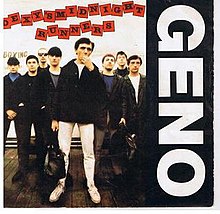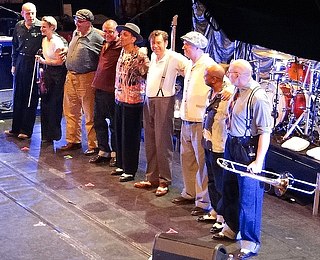
Dexys are an English pop rock band from Birmingham, with soul influences, who achieved major commercial success in the early to mid- 1980s. They are best known in the UK for their songs "Geno" and "Come On Eileen", both of which reached No. 1 on the UK Singles Chart, and achieved six other top-20 singles. "Come On Eileen" also topped the US Billboard Hot 100, and, with extensive airplay on MTV, they are associated with the Second British Invasion.
The Blue Ox Babes were an English pop group, formed in early 1981 by former Dexys Midnight Runners guitarist Kevin 'Al' Archer, together with his girlfriend Yasmin Saleh, guitarist Nick Bache and former Dexys keyboard player Andy Leek. Archer was keen to mix the soul sounds of his previous group with folk styles. To this end he recruited fiddle player Helen O'Hara to play on demo tapes of the new songs he had written. When former colleague Kevin Rowland heard these demo tapes, he invited O'Hara to join Dexys, and adopted a similarly folk-influenced sound for his own group.
The Bureau were an English new wave soul group formed in November 1980 in Birmingham, England, when the original line-up of Dexys Midnight Runners split up. The Bureau retained their Dexys roots and played powerful brass-driven soul sounds. They are best known for their single "Only For Sheep", which reached No. 5 in Australia.

Kevin Rowland is a British singer and musician best known as the frontman for the pop band Dexys Midnight Runners. The band had several hits in the early 1980s, the most notable being "Geno" and "Come On Eileen", both of which reached number one on the UK Singles Chart.

"Come On Eileen" is a song by the English group Dexys Midnight Runners, released in the United Kingdom in June 1982 as a single from their second studio album Too-Rye-Ay. It reached number one in the United States and was their second number one hit in the UK, following 1980's "Geno". The song was produced by Clive Langer and Alan Winstanley and was initially claimed to be written by Kevin Rowland, Jim Paterson and Billy Adams, although Rowland later stated that the essence of the tune should be attributed to Kevin Archer.
Kevin "Al" Archer is an English guitarist and songwriter.

Searching for the Young Soul Rebels is the debut studio album by English band Dexys Midnight Runners, released on 11 July 1980, through Parlophone and EMI Records. Led by Kevin Rowland, the band formed in 1978 in Birmingham, England, and formed a strong live reputation before recording their first material. Recorded during April 1980, the album combines the aggressiveness of punk rock with soul music, particularly influenced by the Northern soul movement.
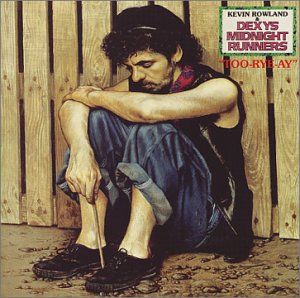
Too-Rye-Ay is the second studio album by English pop band Dexys Midnight Runners. It was released in July 1982 by Mercury Records. The album is best known for the hit single "Come On Eileen", which included the refrain that inspired the album's title. It was the band's most successful album, debuting at number two on the UK Albums Chart.

Don't Stand Me Down is the third studio album by English pop band Dexys Midnight Runners, released in September 1985 by Mercury Records. The title of the album was inspired by a line in the album's song "The Waltz".
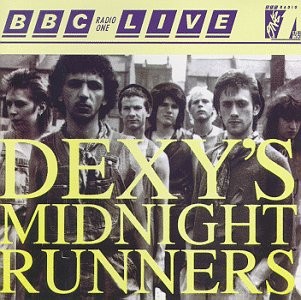
BBC Radio One Live in Concert was a live album by Dexys Midnight Runners, recorded for the BBC in 1982 and released in 1995. It was the group's first official live album and remained their only official live album until the release of The Projected Passion Revue in 2007. The album is unique as it is Dexys' only live recording where the members of The Projected Passion Revue horn section are present alongside the Too-Rye-Ay strings. Immediately after this concert, the horn section left the group and formed The TKO Horns.
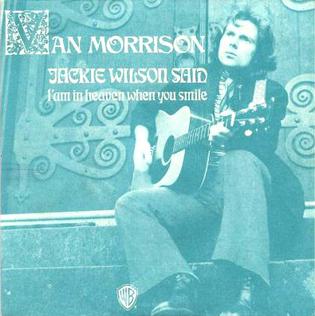
"Jackie Wilson Said (I'm in Heaven When You Smile)" is a song written and performed by Van Morrison and featured as the opening track on his sixth studio album, Saint Dominic's Preview. It was released by Warner Bros. in July 1972 as the first of three singles from the album and charted at number sixty-one on the US Billboard Hot 100. Both the music and lyrics are inspired by rhythm and blues singer Jackie Wilson and his song "Reet Petite", which is directly quoted in the song.
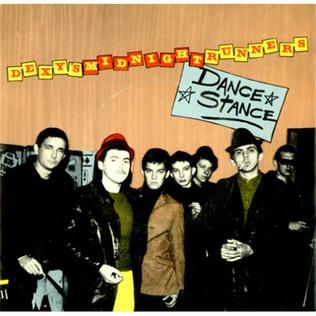
"Dance Stance" is the first single by Dexys Midnight Runners. Written by frontman Kevin Rowland, the song was released in 1979 on the independent label Oddball Records. It reached No. 40 on the UK Singles Chart in early 1980.
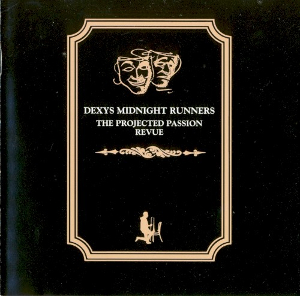
The Projected Passion Revue is a compilation album by the group Dexys Midnight Runners, comprising recordings made in 1981, between the group's first album Searching for the Young Soul Rebels and its second, Too-Rye-Ay. The album represents a stage in the group's development which built upon the blue-eyed soul sound of the original line-up, but came before the group's adoption of a significant folk influence.
The Killjoys were a punk band from Birmingham, England, formed in 1976, with members including Kevin Rowland and Kevin "Al" Archer, who would later form Dexys Midnight Runners, and Ghislaine "Gil" Weston, who would later join Girlschool. Although their releases while still together were limited to one single, subsequent interest has seen an album of their recordings released.

"There, There, My Dear" is a song by English pop band Dexys Midnight Runners, released in June 1980 as the second and final single from their debut album Searching for the Young Soul Rebels. It peaked at number 7 on the UK Singles Chart.

"The Celtic Soul Brothers" is a song by Dexys Midnight Runners, written by band members Mickey Billingham, Jimmy Paterson and Kevin Rowland.

The Wanderer is a solo album by Kevin Rowland, lead singer of Dexys Midnight Runners. It was released in 1988 as his solo debut, three years after the third Dexys album, Don't Stand Me Down.

Let's Make This Precious: The Best of Dexys Midnight Runners is a best-of compilation album by Dexys Midnight Runners, which also contained two newly recorded songs by the group, "Manhood" and "My Life in England ". Dexys had broken up in early 1987, and these two songs, recorded in 2003, were the first new Dexys material since the single "Because of You" in 1986. Nevertheless, the album was similar to the 1991 compilation The Very Best of Dexys Midnight Runners, as eleven of the sixteen older Dexys songs on it had also been included on that album. However, to record the two new songs, Rowland put together a new version of Dexys that featured prior members Pete Williams and Mick Talbot (keyboards) plus new members such as Lucy Morgan (viola) and Neil Hubbard (guitar), and the reformed band played a series of live concerts later in 2003.
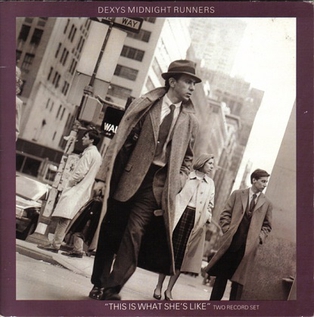
"This Is What She's Like" is a song by Dexys Midnight Runners, released on their third studio album Don't Stand Me Down in September 1985 by Mercury Records, and in November 1985 as a single. The song is credited to Kevin Rowland, Billy Adams, and Helen O'Hara, with production by Rowland and Alan Winstanley. The song, inspired by Rowland's relationship with O'Hara, includes spoken conversations between Rowland and Adams. Rather than answering Adams's repeated in-song question about what "she" is like, Rowland contrasts the "she" of the title with people who irritate him, for example those who put creases in their jeans, and members of the Campaign for Nuclear Disarmament.

"Breakin' Down the Walls of Heartache" is a song written by Sandy Linzer and Denny Randell, and recorded by American soul group the Bandwagon, later known as Johnny Johnson and the Bandwagon. Whilst it was not very successful in the US, it was much more successful in the UK, where it peaked at number 4 on the Singles Chart and was awarded a silver disc for 250,000 sales there.
